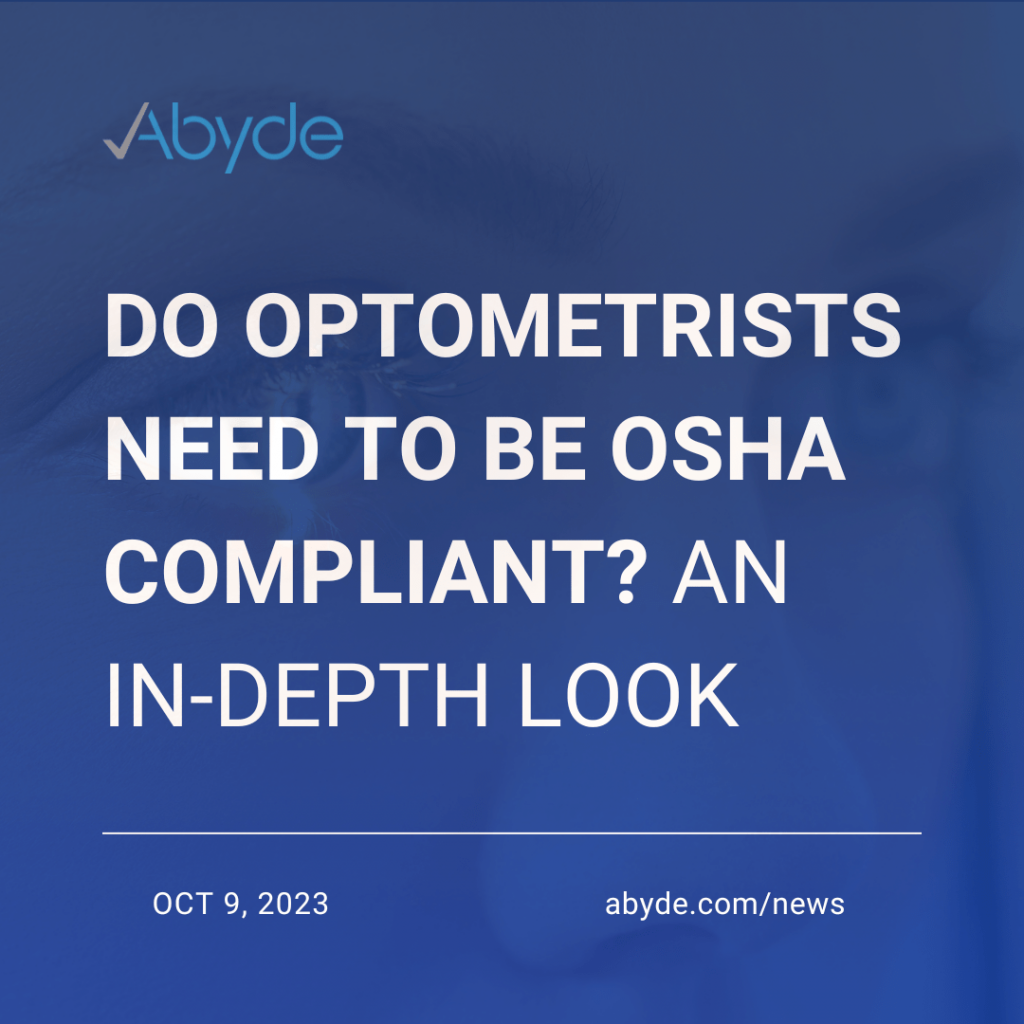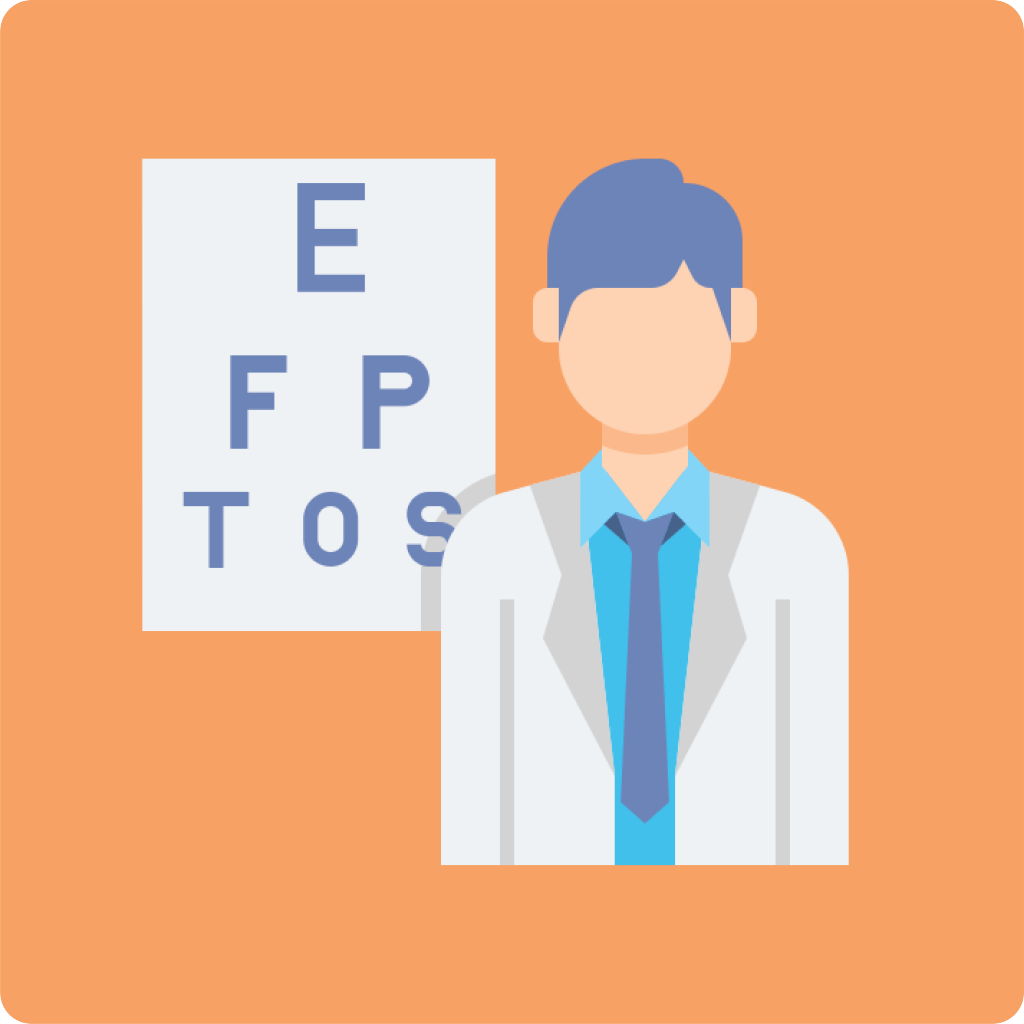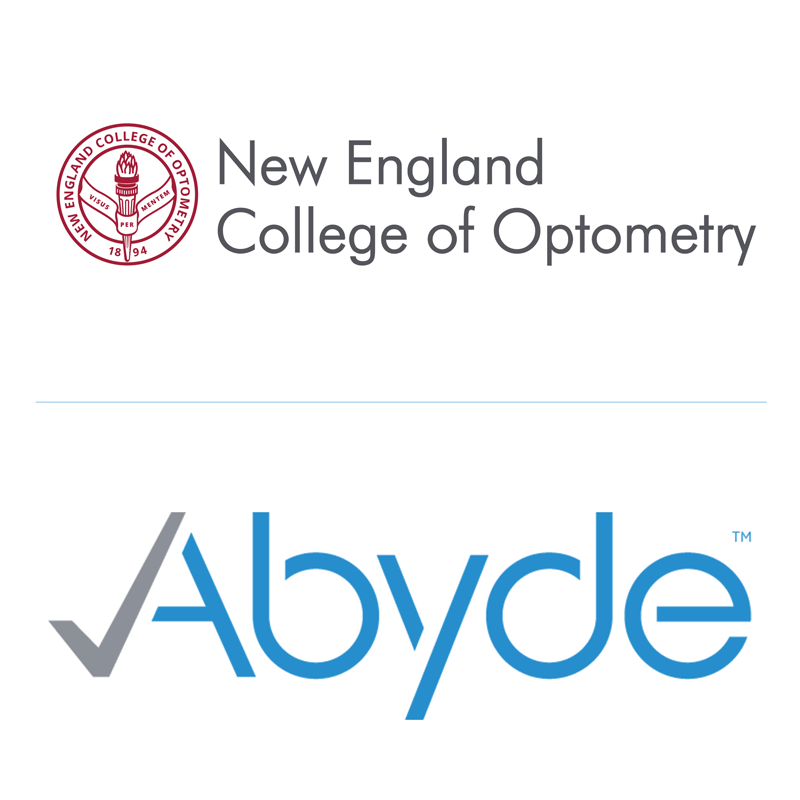October 9, 2023 In the healthcare sector, there’s often a misconception that only large hospitals or medical practices must concern themselves with compliance standards. This is far from the truth, especially regarding regulations like those set forth by the Occupational Safety and Health Administration (OSHA). So, where do optometrists fall on the compliance spectrum? What is OSHA? The Occupational Safety and Health Administration (OSHA) is a branch of the United States Department of Labor that sets guidelines and standards to ensure safe and healthy working conditions. OSHA regulations encompass a variety of industries, including healthcare, construction, manufacturing, and more. OSHA Regulations and Optometry Practices OSHA regulations apply to any workplace where there is a potential for injury or illness. In an optometry office, employees are exposed to various risks, ranging from potentially hazardous chemicals used for cleaning lenses to sharp objects like needles or scalpel blades that might be used in minor procedures. Key Areas of Compliance for Optometrists Penalties for Non-Compliance Non-compliance could result in significant financial penalties and even temporary or permanent closure of the practice. OSHA regularly conducts inspections, and failure to meet the standards can result in hefty fines, which can severely affect the financial stability and reputation of the practice. Are There Any Exemptions? There are very few exemptions to OSHA compliance. Even if an optometry practice has few employees, they must usually adhere to OSHA regulations. Optometrists must ensure they are fully aware of and in compliance with all relevant OSHA regulations to avoid penalties and maintain a safe work environment. Conclusion In summary, the need for OSHA compliance in optometry practices is not just a recommendation—it’s a legal requirement. Ignoring these standards puts your practice at risk for penalties and jeopardizes the safety of your employees and patients. How Can Abyde Help? Navigating through the complex web of OSHA compliance can be overwhelming. That’s where Abyde comes in. We specialize in HIPAA and OSHA Compliance solutions for healthcare providers. Our software can guide you through the process, ensuring that your optometry practice remains compliant without taking up much time. Take the first step toward full OSHA compliance today. Visit our website to schedule a free consultation and discover how Abyde can make compliance hassle-free for your practice. Resources
Optometrists Need OSHA too!
October 11, 2022 “Why should I be concerned about OSHA? I’ve never heard anything about OSHA and vision clinics?”- an actual Abyde customer Optometrists can feel the sting from OSHA, but it isn’t a sting like getting shampoo in your eye that goes away after washing it out. It’s a financial sting, much like cutting a jalapeno and wiping your eye, and requires a more serious treatment method. OSHA is ramping up their staffing, and holding their regulations to the highest standards we’ve seen yet. Sure, when you put OSHA into your search bar you see hardhats and bright green vests, it doesn’t look like it applies to you. We are here to tell you no one is exempt from regulations unless specifically stated. We have done our research, we see the importance for our customers, and now it’s time to educate on why it applies to Optometry. Optometrists and their staff always use best practices in wiping down the chin and head strap before sending that always anticipated, but yet startling ‘puff’ to the eyeball. When sitting in the big chair and ready to use the machine that has patients looking like Dr. Robotnik, they always clean it beforehand. But, what may not be recognized is that the cleaning solution used in best practice, is required to be logged and updated under OSHA Standards. Let’s not forget about the education Optometrists give patients on the benefits of getting eyes dilated. When patients consent to wearing the cool disposable sunglasses, the Doctor’s responsibility is to have OSHA approved regulations in place while using the chemical. This includes but is not limited to having it logged in the Safety Data Sheet (SDS), but also making sure all staff is trained on usage to avoid any injuries. Documenting your hazardous chemicals and training staff for implementation, is part of the real definition of best practice according to us here at Abyde, and we of course give you everything you need to do so. While patients may need eye drops for getting shampoo in the eye, they won’t be getting any eye diseases that an Optometrist needs to treat. However, while treating eye diseases, OSHA standards for Exposure Control are required to be followed. That includes any bacteria, bloodborne pathogens, and maintaining proper protection is key! Let’s not forget the hazardous chemicals you’re using for treatment. Now that we’ve gone full circle, we haven’t even started the race on OSHA importance in Optometry. So, to answer the Abyde customer(s) who are wondering why they should be concerned about OSHA, we have much more education available for all of our Optometrists! Knowledge is power, (and in this case, a money saver), y’all.
Abyde HIPAA Compliance Software Provider Launches Revolutionary Partnership with New England College of Optometry
July 29, 2020 July 29, 2020, Tampa, FL –Abyde, an industry-leading, user-friendly HIPAA compliance software solution, today announced it has partnered with the New England College of Optometry (NECO) to provide HIPAA Compliance training for NECO students and faculty. This first of its kind partnership has paved the way for streamlining and enhancing HIPAA education provided for NECO students, in addition to preparing future Doctors of Optometry to better understand HIPAA-compliance after graduation. Abyde, already known for revolutionizing HIPAA compliance, has taken new steps with their NECO partnership to create and curate HIPAA content specifically for promising future doctors. In addition to student-specific content, Abyde has now bridged the gap between clinical training and professional practice to highlight how HIPAA plays an important daily role for a covered entity. Through this new partnership, NECO has proven their commitment to HIPAA compliance in addition to a continuing, revolutionary approach to enhanced and engaging educational content that best prepares their students for success after graduation. As part of their collaboration, Abyde offers exclusive discounts to NECO alumni as they graduate and join the eye care workforce. “Abyde has enabled NECO to use the same HIPAA training platform for clinical faculty, staff, and student interns. This allows for continuity and consistency as we see patients across the NECO Clinical Network and send students out for their clinical rotations. Managing and tracking so many people at once would have been difficult, but now Abyde has customized our experience into a seamless process. They have been extremely responsive and supportive throughout the setup process.” Amy Moy, OD, FAAO, Chief Compliance Officer. “This opportunity and exciting new type of collaboration has allowed Abyde to expand its impact on the healthcare community by partnering with such a prestigious institution that is the New England College of Optometry,” added Matt DiBlasi, President of Abyde. “We are continually challenging ourselves to go further, and we are delighted to play a part in NECO’s students graduating and launching successful, HIPAA-compliant practices of their own.” Used by thousands of providers across the nation, Abyde is a complete HIPAA program covering the required Security Risk Analysis, HIPAA training for doctors and staff, Business Associate Agreements, customized practice-specific policies, and more. About New England College of OptometryNew England College of Optometry is an independent graduate college of optometry that educates students for careers in eye care delivery, research, and education. Founded in 1894, NECO is the oldest continuously operating school of optometry in the country and was the first to create an expansive clinical training network. We challenge students to think creatively about vision and sight and to contribute to the future of the field. In doing so, we provide quality optometric care to more than 150,000 individuals annually and serve the community through a network of healthcare organizations and access to vision screenings. www.neco.edu About AbydeAbyde (Tampa, FL) is a software company dedicated to revolutionizing HIPAA compliance for medical professionals. Launched in January 2017, Abyde was formed with the idea that there could exist an easier, more cost-effective way for healthcare providers to comply with government-mandated HIPAA regulations. For more information on Abyde visit abyde.com or call (800) 594-0883. Read the full press release here.


